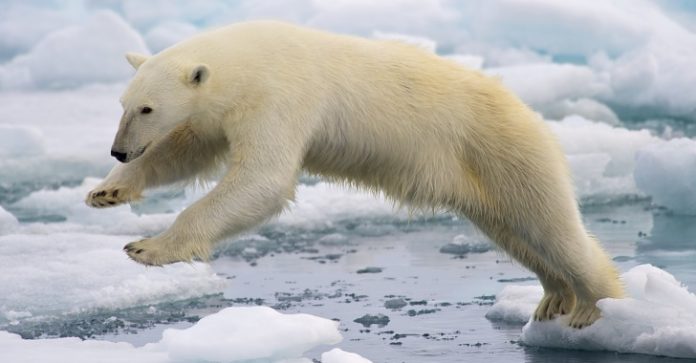
Written by Claire Bernish at theantimedia.org
Unless drastic measures are taken to reduce global pollution, polar bears will completely die out. That is the conclusion of the U.S. Fish and Wildlife Service, which released its first “Conservation Management Plan for Polar Bear” on Thursday. Can anything be done to prevent the polar bear’s extinction?
“The single-most important step is decisive action to address Arctic warming,” states the CMP.
The loss of the bear’s natural sea-ice habitat constitutes the largest and most direct threat to its chances for survival. Depletion of three of the four sea-ice ecoregions is “projected to lead to decreased or greatly decreased”polar bear populations as soon as 2050. Outlook is grim in both study models—whether emissions are greatly curbed or not, population decline will worsen. However, if steps are taken to rein in greenhouse gas emissions to moderate or lower levels, the polar bear species might survive long-term.
“Polar bear conservation requires a global commitment to curb the release of greenhouse gases into the atmosphere,”said USFWS Regional Director Geoffrey Haskett. “Until that happens, we’re going to do everything within our power to give the polar bear a chance to survive. That’s what this plan’s about.”
Also addressed in the CMP are methods to minimize risks from oil and chemical spills and reduce disturbances from industrial activity and destructive practices—overall, an effort to lessen human impact on the species.
The U.S. Geological Survey released a study with virtually identical conclusions. “Greenhouse gas emissions remain the primary threat to the preservation of polar bear populations worldwide,” the report stated.
Global policy to address emissions is essential now “[b]ecause carbon emissions accumulate over time, there will be a lag, likely on the order of several decades, between mitigation of emissions and stabilization of sea ice loss,”explained USGS research ecologist Mike Runge.
“The most optimistic prognosis for polar bears would require immediate and aggressive reductions of greenhouse gas emissions that would limit global warming to less than 2°C [35.6°F] above preindustrial levels,” stated the report.
Both studies pointed to the latter half of the century as a defining moment for the polar bear. Summer ice-free periods—during which the bears are forced to hunt on land away from primary prey—are projected to extend past four months. And according to the USGS, “terrestrial foods available to polar bears during these land-bound months are unlikely to help polar bear populations adapt to sea-ice loss.”
Despite both studies—including its own bleak report—the U.S. Fish and Wildlife Service issued a “Letter of Authorization” to Shell on Tuesday with a startling twist. According to the authorization, the oil giant is allowed to“take small numbers of polar bears and Pacific walrus incidental to activities occurring during its ‘Outer Continental Shelf 2015’ exploration drilling program in the Chukchi Sea” this summer.
Even with strict federal oversight, ecologists and environmentalists are outraged. “[W]e believe the correct course of action for the administration would be to rescind the approval of Shell’s exploration plan” because “we have conflicting information of the impact of Shell’s activities on the marine life in the Chukchi Sea,” said Oceana Arctic Campaign Manager Chris Krenz.
With battles raging—even for acceptance of the premise of global warming—the dismal prospect of an untimely end for the polar bear is inferable. It should be an embarrassing and disgraceful commentary on the selfish human tendency to utterly disregard the world at large—no matter the consequence.
Jack Omelak, Executive Director of the Alaska Nanuuq Commission, summarized sadly, “In the words of our founder Charles Johnson, when we lose polar bears, we also lose our cultures.”
Get Your Anonymous T-Shirt / Sweatshirt / Hoodie / Tanktop, Smartphone or Tablet Cover or Mug In Our Spreadshirt Shop! Click Here<




